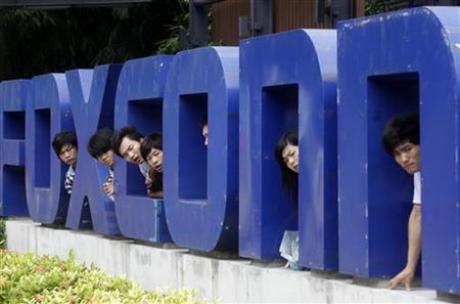Foxconn Wants To Build Tablets, Smartphones in USA
Foxconn will likely manufacture high-end devices in the United States.
Late last year, Louis Woo, a spokesman for Foxconn Technology Group, confirmed that the company is looking to expand its operations in North America. The confirmation arrived after a previous report claimed that Foxconn was bringing U.S. engineers to Asia for training before sending them back to the States. Sources said American factories would focus on LCD TV production instead of Apple hardware.
Now Foxconn chairman and President Terry Gou revealed to the Asian press this week that the company is actively looking into the possibility of setting up factories for manufacturing high-end smartphones and tablets here in the States. Typically, manufacturing has been overseas because it's cheap, but the strengthening of the yuan, the growing wages in China, and the lack of skilled workers have put pressure on the company to look elsewhere.
UnwiredView cites two reasons why Foxconn wants to set camp in America: because of the Obama Administration's focus on bringing back manufacturing jobs (AKA incentives), and the highly skilled workforce the company could establish. However, the problem is that American workers will ask for larger wages, so Foxconn may offset this expense by using highly automated production tools. Thus, the company will have the same output of its Chinese factories, but with fewer workers.
According to the report, Foxconn wants to open two headquarters here in the States: one on the West Coast and one on the East Coast. These two offices will be tasked with finding locations for factories, which will only manufacture high-end devices due to the higher cost of operation. China factories will continue to manufacture lower-end devices. Arizona Governor Janice Brewer reportedly met with Gou to discuss a possible factory in her state.
Gou reportedly thinks that there are too many software companies in the United States as it is, especially on the West coast, compared to hardware designers and manufacturers. He believes that Foxconn's investments will make the nation more balanced in regards to software vs. hardware development. He also believes that innovation will likely come from the United States more so than from Taiwan.
Last year spokesman Louis Woo acknowledged that Americans simply want more of their products manufactured locally. The drawback to establishing local factories, according to Woo, is that the supply chain itself will present a challenge. "In addition, any manufacturing we take back to the U.S. needs to leverage high-value engineering talent there in comparison to the low-cost labor of China," Woo added.
Get Tom's Hardware's best news and in-depth reviews, straight to your inbox.

Kevin Parrish has over a decade of experience as a writer, editor, and product tester. His work focused on computer hardware, networking equipment, smartphones, tablets, gaming consoles, and other internet-connected devices. His work has appeared in Tom's Hardware, Tom's Guide, Maximum PC, Digital Trends, Android Authority, How-To Geek, Lifewire, and others.
-
emad_ramlawi They need to replace the free suicide nets with free fast food, and that will probably work, but they wont be as fast as those Chinese, the manufacture line may get slow and bloaty.Reply -
Buddy Couch It seems Obama planned on bringing back jobs, I really like that guy, problem is the jobs are for Motoman, Fanucman, add in your robot here. Maybe I don't like that guy.Reply -
JD88 Not everyone can be an engineer or lawyer. If these jobs pay decent and offer healthcare, I welcome it. It's about time China shipped some jobs back over here.Reply -
jimmysmitty Reply12007712 said:They need to replace the free suicide nets with free fast food, and that will probably work, but they wont be as fast as those Chinese, the manufacture line may get slow and bloaty.
From what I have been reading, the labor work force in China is actually starting to cost more when they are not breaking labor laws so the US doesn't seem as pricey as it used to.
It would be good to get manufacturing jobs back here though. Back when we were a industrious and manufacturing nation there was less poverty and people know how to work for a living.
These days people are so self involved and expect to be given everything it's sad really. -
ethanolson We won't only ask for higher wages. They won't be allowed to hire an American with lower wages because of how high our minimum wage is... compared to the Chinese.Reply
I hope they can hire teenagers. Our rising generation needs to build work ethic, and nothing does it like a factory. -
ZolaIII I am proud to be American, i will bay 600$ iPhone built by Americans (exploited Hispanic majority) for Americans because that makes me American. I will not bay those horribly bad comi-rat devices that costs 200$ that comes whit Socialist so called open community OSis bat with our fine software like iOS (BSD based)!Reply
So they will put in more robots & rest will be automatons... -
littleleo Does this mean the US suicide rate is due to rise once the Foxconn plants open in the here?Reply
